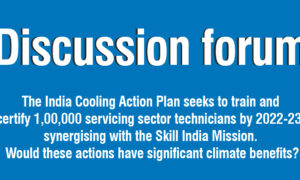S Karthikeyan, Principal Counsellor, CII- Godrej GBC, Hyderabad

At the start of the green building movement in early 2000’s, the major challenge was the availability of professionals who could support green building design, construction, operation and maintenance. CII- Indian Green Building Council (IGBC) has taken many initiatives for training the professionals who can support in construction of green buildings.
IGBC has instituted a National level programme for accreditation of professionals. As on date, we have more than 3,600 accredited green building professionals available in the country. As part of our various training and capacity building programmes, we have been inviting experts from air-conditioning industry to train the professionals on various aspects of air-conditioning. Still, we have a long way to go in addressing the issues related to availability of trained professionals in air-conditioning
CII- IGBC has been working with ISHRAE on educating and training the HVAC professionals on green building concepts. We would continue to work with all the key stakeholders and increase the number of professionals at national level for supporting the green building movement.
Aayush Jha, Founder & CEO, Clairco

The HVAC industry in India, especially if you look from a green building perspective, has to be much more energy efficient. Most of the manufacturers do not have the expertise or R&D to help them move on to the next generation of energy efficient ACs. If you look at green buildings, the overall power consumption has to be lower than a particular standard for them to get certification. We need more companies to invest in R&D and focus on greener technologies. HVACs in India consume incredible amount of power; around 85 per cent of the building’s energy, needs to be repaired as soon as possible.
Kulwant Singh, Owner & Entrepreneur, Kleanwave Solutions

Lack of HVAC technical expertise creates a snag during conversion of energy efficient design into reality. Due to the lack of expertise, even the machines designed for highest energy efficiency sometimes fails to perform and it’s a big deal for the product brand. To address this, the India Cooling Action Plan seeks to train and certify 1,00,000 servicing sector technicians by 2022-23. Initiatives such as Skill India may improvise the HVAC service sector. Also, the giants of HVAC sector should focus on the service training programmes, which could improve service quality and lower unemployment.
Maggie Leslie, Program Director, LEEDH QAD, Green Built Alliance

The best way for HVAC designers and installers to gain technical expertise is by participating in green building certification programmes, which require testing and commissioning of systems to meet the performance benchmark. Some certification programmes provide low-cost and low-time-commitment educational classes to HVAC contractors; especially when required, those offerings have proven to be a valuable and effective way to increase the knowledge of HVAC contractors. However, the most effective tool in our local market has been the involvement of knowledgeable and dedicated Home Energy Raters in building projects. Raters come onsite during required framing/pre-insulation inspections while HVAC systems are being installed and can often spot issues early. Additionally, rough-in testing while HVAC installers are onsite can allow Raters to show exactly where leaks are still occurring. This onsite education requires that the building’s contractor be dedicated to performance enough to make sure HVAC installers are onsite when the Raters come for an inspection. It also requires that HVAC companies be receptive to the training. Having an efficient HVAC system means that it was installed to function as intended. This level of quality should be an expectation and not considered an upgrade.
Shashi Shekhar, Managing Director, Camfil Air Filtration India Pvt. Ltd

Air filters in AHUs are essential for maintaining the quality of air in a building or premise, and the challenge is that the awareness for latest standards followed globally is low. Execution is also a challenge, as people generally look at the initial cost of setup and forget to focus on the lifecycle cost. These issues can be tackled by spreading awareness. Certification of engineers, technicians and operators is also essential.
Cookie Consent
We use cookies to personalize your experience. By continuing to visit this website you agree to our Terms & Conditions, Privacy Policy and Cookie Policy.














